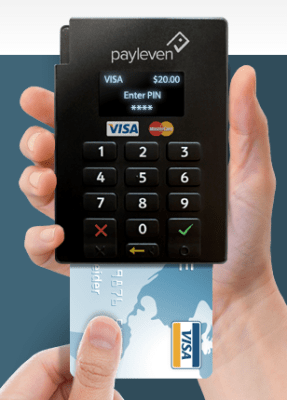There is no single mobile payment company in Europe that has reached the scale and stature that Square has in the U.S., where the Jack Dorsey-led startup processed $1 billion in transactions in 2012. Payleven, one of the many mobile payment startups that want to take that crown on the other side of the pond, is today announcing two more steps in its strategy to convince businesses and consumers to sign on. Payleven, part of the Samwer brothers’ Rocket Internet stable, has been authorized as a payment institution by the UK’s Financial Services Authority; and it is also now part of MasterCard’s mPOS program — two moves to improve its credibility as a secure payment provider.
This makes Payleven one of the first companies of its kind to get FSA certification in the UK — but not the first. As one example, iZettle, a well-backed competitor, has FSA approval as a financial institution in Sweden because that is where it’s headquartered. In Europe, approval by one FSA typically extends that approval to the rest of the European countries in the EEA footprint. In the UK, another competitor, SumUp, also has FSA approval as an authorized payment institution.
“We are very proud to be a trusted and fully authorised financial institution in Europe. Payleven is the first mobile payment provider to receive [UK] FSA authorisation, so it’s a major milestone for the company,” said Alston Zecha, co-founder and COO of Payleven, in a statement.
The mPOS certification from MasterCard, meanwhile, puts Payleven on par with a number of other mobile payment providers who have already signed on to MasterCard’s authorization scheme, which lays out best practices for merchants and payment providers, not just in terms of unifying standards but keeping security. It’s another move to improve Payleven’s credibility as a secure payment provider, with MasterCard regularly publishing a list for merchants to see which payment services are able to process different types of transactions.
Payleven last year became the first of the mobile payment companies to unveil a chip-and-pin terminal to process card transactions in the UK.
These are required in the UK for payments on the Visa network, which in Europe now only accepts secure PIN entry as a way of authenticating users making mobile-phone based payments. Since debuting the chip-and-PIN reader last year, Payleven has been working hard to set itself apart from the Samwer “clone” stereotype.
“We are Payleven. We are more than a clone. We are not replicating but we are creating something differently,” Zecha told TechCrunch last year.
Indeed, not only has Square not yet opened for business here in Europe, but it has yet to roll out solutions that would work with chip-based payment cards, focusing first on the magnetic stripe that is more common in its core U.S. market, among other point of sale services. eBay-owned payment provider announced in February that it would be offering its Here mobile payment service in the UK, its first European market, later this year. It will also come armed with a separate device for entering PIN identification to work with a merchant app on a mobile device.
In general, what FSA authorization means is that payment providers have been evaluated and approved by the financial regulator, and that they are meeting a required degree of security and risk management. Certifications of this kind help persuade skeptical businesses that they can put their trust into mobile payment startups not to run off with their money or compromise their security at any point. Longer term, it will also mean that Payleven (and others that get FSA approval) will be able to launch more extensive services directly to their enterprise customers without needing to use third parties who have FSA approval for the task.
In the UK, the FSA has been under fire for its role (or lack of role) in various financial problems over the last several years — one of the most recent being an admission of its slow response to the Libor interest-rate fixing scandal. On the other hand, the FSA has also been making some moves to make it easier for startups like Payleven to get into the transactions game. Just this week, it announced proposals to make it easier for startups to establish themselves as banks — needing just €5 million ($6.4 million) in capital for FSA approval. In other words, approval from an FSA may be a mixed blessing, but an important one all the same.
Payleven has to date publicly disclosed some $15.2 million in funding, with backers including NEA, Holtzbrinck Ventures and Italian businessman/politician Silvio Berlusconi’s family fund.
